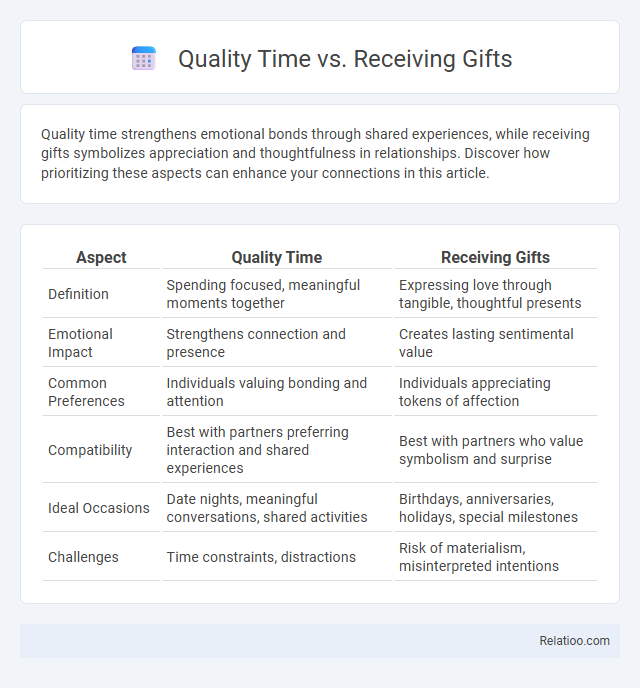Quality time strengthens emotional bonds through shared experiences, while receiving gifts symbolizes appreciation and thoughtfulness in relationships. Discover how prioritizing these aspects can enhance your connections in this article.
Table of Comparison
| Aspect | Quality Time | Receiving Gifts |
|---|---|---|
| Definition | Spending focused, meaningful moments together | Expressing love through tangible, thoughtful presents |
| Emotional Impact | Strengthens connection and presence | Creates lasting sentimental value |
| Common Preferences | Individuals valuing bonding and attention | Individuals appreciating tokens of affection |
| Compatibility | Best with partners preferring interaction and shared experiences | Best with partners who value symbolism and surprise |
| Ideal Occasions | Date nights, meaningful conversations, shared activities | Birthdays, anniversaries, holidays, special milestones |
| Challenges | Time constraints, distractions | Risk of materialism, misinterpreted intentions |
Understanding Love Languages: Quality Time vs Receiving Gifts
Understanding love languages helps you identify how you express and receive affection, with Quality Time emphasizing meaningful presence and undivided attention. Receiving Gifts as a love language centers on tangible symbols of love, showing thoughtfulness through giving and receiving. Recognizing these distinctions enhances communication and deepens emotional connections in relationships.
Defining Quality Time in Relationships
Quality Time in relationships refers to dedicating focused, undistracted moments to connect and engage meaningfully with a partner, emphasizing presence and attention over material exchanges. Unlike Receiving Gifts, which conveys affection through tangible tokens, Quality Time prioritizes shared experiences as a primary love language that fosters emotional intimacy and understanding. This deep focus on mutual interaction strengthens relationship bonds by validating each partner's need for attention and appreciation.
The Emotional Impact of Receiving Gifts
The emotional impact of receiving gifts as a love language lies in the tangible expression of thoughtfulness and care that strengthens the bond between individuals. Gifts symbolize attention to your preferences and convey appreciation, often evoking joy and a lasting sense of being valued. Compared to Quality Time, gifts create a memorable emotional connection through physical tokens that resonate deeply in personal relationships.
How Quality Time Strengthens Connection
Quality Time as a love language fosters deep emotional bonds by encouraging uninterrupted attention and meaningful interactions, which strengthens your connection with loved ones. Unlike receiving gifts, which emphasize tangible tokens, Quality Time centers on shared experiences that create lasting memories and mutual understanding. Prioritizing Quality Time enhances communication, trust, and intimacy, making it a powerful way to nurture relationships.
The Psychological Meaning Behind Gift-Giving
Gift-giving serves as a powerful psychological expression of affection, often symbolizing appreciation, commitment, and emotional investment within relationships. It acts as a tangible representation of love, complementing other love languages such as Quality Time by providing physical tokens that reinforce emotional bonds. The act of selecting and giving meaningful gifts activates reward centers in the brain, fostering feelings of happiness and strengthening interpersonal connections.
Quality Time Activities for Deeper Bonds
Quality time activities such as shared hobbies, deep conversations, and mindful presence strengthen emotional connections by fostering understanding and trust. Engaging in meaningful experiences together enhances the impact of the quality time love language compared to receiving gifts, which offers tangible but often short-lived expressions of affection. Prioritizing quality time nurtures intimacy and communication, key factors in developing lasting, deeper bonds in relationships.
Navigating Differences in Love Language Preferences
Understanding love language preferences is essential for navigating differences in how partners express affection, with Quality Time emphasizing dedicated presence while Receiving Gifts focuses on tangible tokens of appreciation. Recognizing that each love language fulfills distinct emotional needs helps avoid misunderstandings and fosters deeper connection. Prioritizing open communication about preferred expressions of love supports relationship harmony and emotional fulfillment.
Balancing Quality Time and Gift-Giving
Balancing quality time and gift-giving is essential in expressing love effectively, as both are significant love languages that fulfill different emotional needs. Quality time fosters deep connection and meaningful conversations, while thoughtful gifts symbolize appreciation and care through tangible expressions. Understanding a partner's love language preferences allows for a harmonious combination of presence and presents, enhancing relationship satisfaction and emotional intimacy.
Misconceptions About Material vs Emotional Connection
Many people mistakenly equate receiving gifts with genuine emotional connection, overlooking that Quality Time often serves as a more profound love language that fosters deeper intimacy and understanding. Your emotional bond strengthens when shared experiences and undistracted moments take precedence over material possessions, challenging the misconception that gifts alone express true affection. Recognizing the distinct impacts of each love language helps clarify how authentic connection transcends tangible items, emphasizing presence and emotional availability over material exchange.
Tips to Communicate Love Effectively
To communicate love effectively, recognize that Quality Time as a love language emphasizes undivided attention, so prioritize meaningful activities and active listening to foster connection. When gifts are the preferred love language, thoughtful and personalized presents symbolize affection, making consistency and sincerity crucial to convey genuine care. Understanding and respecting your partner's dominant love language, whether through words, touch, time, or gifts, strengthens emotional bonds and ensures your expressions of love resonate deeply.

Infographic: Quality Time vs Receiving Gifts
 relatioo.com
relatioo.com